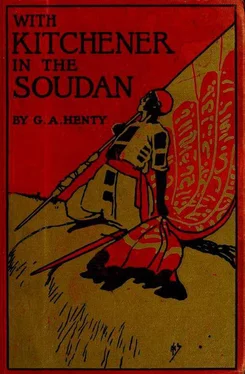The 21st Lancers, out in skirmishing order, were speedily driven back by the Dervishes, and retired into the zareba. When the latter came near enough to see the small British force, a shout of exultation rose from their ranks, for they felt certain now of surrounding and annihilating the infidels, according to the prophecy. On our side the satisfaction was no less marked. The front line moved forward to the thorny hedge and prepared to open fire above it. The black troops uttered a joyful shout of defiance as they took their places in their trenches.
When the enemy were two thousand eight hundred yards away the three batteries on the left of the zareba opened fire, and two batteries on the right, and a number of Maxims, joined in pouring shell and bullets into the thickest of the Dervish mass round the Khalifa's banner.
The effect was terrible. For a moment the Dervish lines halted, astonished at the storm to which they were exposed. But it was only for a moment. The wide gaps were filled up, and at a quicker pace than before, the great line swept on, the banner-bearers and Baggara horsemen pushing forward to the front to encourage the infantry. Seeing how persistently they were coming on, the Sirdar ordered the men of Lyttleton's brigade to open fire at long range. The Grenadiers were the first to begin, firing volleys in sections. The other regiments of the brigade were soon hard at it, but neither they nor the Maxims appeared to be doing serious execution, while the terrible effect of the shell fire could really be seen. But although great numbers of the enemy were killed or wounded by the bursting shells, there was no halt in the forward movement.
Suddenly over the crest and sides of the Surgham Hill the division of the Dervish right, reinforced by a portion of Yacoub's division, appeared, and over fifteen thousand men came streaming down the hill waving banners and shouting their war-cries. They were led by their emirs on horseback, but the infantry kept pace with these, occasionally discharging their rifles at random. The guns of the three batteries and one of the Maxims were swung round and opened upon them. They were less than a mile aAvay, and the whole of Gatacre's division opened a terrific fire. Still the Dervishes held on, leaving the ground they passed over white with fallen men. From seventeen hundred yards the sights had to be lowered rapidly, but at a thousand yards they held their foe. No man could cross the ground swept by the hail of balls. So rapid and sustained was the fire that men had to retire to refill their pouches from the reserve ammunition, and the rifles were so heated that they could no longer be held. In some cases the men changed their weapons for those of the companies in reserve, in others these companies closed up and took the places of the front line. Not for a moment was there any cessation in the fire.
Unable to do more, Yacoub's men moved towards the front and joined the main body, whose advance had been checked by the fire of Maxwell's Egyptian brigade. A few rounds had been fired by the three cannon that the Khalifa had brought out with him, but they all fell short. On our side the casualties had been few. In their desperate attempt to get at close quarters the Dervish riflemen had not stopped to reload the weapons they had discharged, and there was practically no return to the awful fire to which they had been exposed.
But while Yacoub's force had been terribly punished, and the main body, brought to a stand-still at a distance of fourteen hundred yards, had suffered almost as heavily, the battle had not gone so well to the right of our position, towards which the Khalifa was now moving. Broadwood's horse and the camel corps had been driven off the hill they occupied, and so fierce was the attack that three of the guns of the horse-battery had to be left behind. The camel corps were ordered to retire rapidly and make for shelter to the right rear of the camp. The force made two or three stands, and the Egyptian cavalry more than once charged the pursuing horsemen. The gunboats opened fire and covered the final retirement of the camel corps, which had lost eighty men. The cavalry did not retire to the zareba, but continued to fall back, occasionally turning and facing the enemy, until they were five miles away, when the Dervishes gave up the pursuit, and sat down to rest after their tremendous exertions.
Although forced to retire, the cavalry had done good service, for they had drawn off a great body of the enemy at a critical moment, and these were unable to return and take part in the battle still raging. At length the Khalifa moved off with all his force behind the western hills, and for a short time there was a lull in the battle. Many of the wounded tribesmen crawled up to within seven or eight hundred yards of the zareba and there opened fire. Their aim was good, and men began to drop fast in spite of the volleys fired to clear off the troublesome foe. But their fire was soon disregarded, foi from the ravines in the range of low hills behind which the Khalifa's force had disappeared, a mass of men burst out at a hard run. From their shelter behind Surgham Hill a portion of the force who were there also swept down to join the Khalifa, while Yacoub advanced from the south-west, and another body from the west.
Instantly the infantry and artillery fire broke out again. On the previous day the distance had been measured and marked on several conspicuous objects, and the storm of shells tore the ranks of the enemy and the rifles swept them with a rain of bullets. But in face of all this the Dervishes continued to advance at a run, their numbers thinning every minute. Two or three hundred horsemen, with their emirs, dashed at the zareba at full gallop; shrapnel, Maxim, and rifle bullets swept their ranks, but nearer and nearer they came, with lessening numbers every yard, until the last of them fell within about two hundred yards of Maxwell's line. Animated by the example, the infantry rushed forward. The black flag was planted within nine hundred yards of Maxwell's left, but in addition to the Egyptian fire the cross-fire of the British divisions poured upon those around it. The main body began to waver, but the Khalifa and his emirs did their best to encourage and rally them. The flag was riddled with balls, and the men who held it were shot down; but others seized the post of honour until a pile of bodies accumulated round it.
At last but one man remained standing there. For a minute he stood quietly immovable, then fell forward dead. Then the Dervishes lost heart and began to fall back in ones and twos, then in dozens, until the last had disappeared behind the hills. The troops then turned their attention to the men who, lying in shelter, were still maintaining their fire. There were fully a thousand of these, and the greater portion of our casualties took place from their fire while the troops were occupied in repelling the main attack. It was not long, however, before bullets and shell proved too much for them, and those who survived crawled away to join their kinsmen behind the hills It was eight o'clock now, and the victory had apparently been won. Some ten thousand of the Khalifa's best troops had been killed or wounded. In the British division one officer and one man had been killed, and three officers and sixty-five men wounded. The latter were at once placed on board the hospital barges ; fresh ammunition Avas served out, and half an hour after the last shot was fired the army prepared to march on Omdurman.
It was most important that they should arrive at the town before Ed Din's Dervishes should reach it, for unless they could do so, the loss that would be incurred in capturing it would be vastly greater than that which had been suffered in the battle. At nine o'clock the start was made. The troops advanced in brigades, Lyttleton led on the left, Wauchope was on his right, Maxwell somewhat in the rear, while still more to the right came Lewis, and farther out on the plain Mac-donald. They formed roughly half a semicircle. Lyttleton, followed by Wauchope, was to march between the river and Surgham Hill, Maxwell was to cross over the hill, while Lewis and Macdonald were to keep farther out to the right. Collin-son's Egyptian brigade was to guard the stores and materials left behind.
Читать дальше












